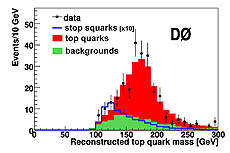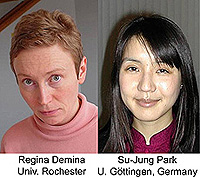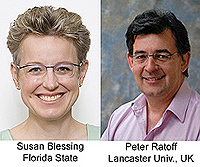You can't top stop
Search, search, search for squarks,
They're what we'd like to see,
And so we hunt and hunt and hunt for
Supersymmetry.
- To the tune of "Row, row, row your boat"

DZero scientists used several variables to look for the presence of a stop squark signal. In this plot, the distribution of reconstructed top quark mass for events in which top quarks were made (red), stop squarks were made (blue) and unrelated background (green) are compared to data.
Supersymmetry is a scientific principle proposed as a likely extension of the Standard Model. If true, it would answer a number of questions. A particular theory that incorporates this idea, the minimal supersymmetric standard model, predicts that each existing subatomic particle has two supersymmetric cousins that have similar names. For instance, the cousin of the top quark is the stop squark.
Because the top quark has such a huge mass, the MSSM predicts that the two stop squarks could have very different masses. The lighter of the two could have a mass comparable to the top quark itself. Ironically, the supersymmetric partner of the behemoth top quark might be the lightest of the squarks.
A paper detailing the search by DZero physicists for the lighter stop squark has just been accepted for publication in Physics Letters B. Top quarks decay 100 percent of the time into a b quark and a W boson. In this study, the analyzers assumed that stop squarks decayed 100 percent of the time into a b quark and a chargino (the supersymmetric analog of the W boson). The chargino then decays into a W boson and another supersymmetric particle called the neutralino. The neutralino is a leading dark-matter candidate. It does not interact with matter and escapes the detector. Thus, both the top quark and the stop squark have a b quark and a W boson as a decay product. This makes the data set used for studying top quarks also ideal to search for stop squarks.
Because the masses of the stop squark, the chargino and the neutralino are all unknown, DZero physicists searched for many possible combinations. While their search revealed no evidence for the existence of the stop squark, the data did allow them to set limits on the production of these elusive particles. With additional data, there remains an encouraging chance that the Tevatron might discover squarks. One thing is clear: Physicists the world over will continue to search for supersymmetry in the upcoming years.
OK, everybody, all together:
Search, search, search for squarks.
-- Don Lincoln
 |
| These physicists played a leading role in this analysis. |
 |
| The DZero Style Council. All papers that come from DZero undergo stringent scientific and grammatical review. Susan Blessing or Peter Ratoff reads each publication to ensure it conforms to the strict language standards of physics journals. |
|